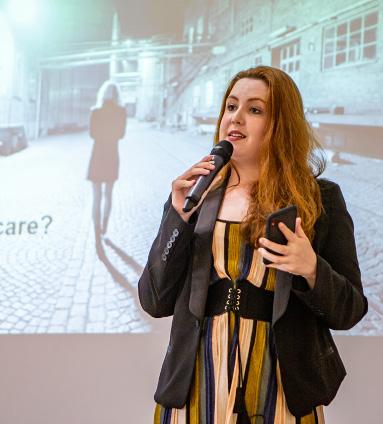
8 minute read
Blavatnik Practical Skills
PREPARING A TOOLSET FOR PROFESSIONAL EXCELLENCE
BLAVATNIK PRACTICAL SKILLS
Throughout the year scholars get the practical skills needed to make a difference in their chosen careers particularly how to communicate effectively and with impact. Sessions included storytelling, writing for social media and the web, pitching, presenting, and the day-long ‘Communicating Impact coaching on camera session at the Leadership Forum.
This year, thanks to Rasha Saïd Khawaja and her pioneering Toucan and Lark projects, we also had a story-telling workshop with the Globe Theatre which provided tips in preparing for presentations and how to feel confident in the room wherever you find yourself.
Enterprise Challenge Pitch to Business Leaders
Interview Skills
On-camera Training for Public Speaking
AGL (Communciation Coaching) was amazing! I personally had a breakthrough in communication struggles I have had for a while. The best part of the Leadership Program for me.” “
Natalia Brigagão Carvalho
Brazil, Magister Juris, Oxford-Weidenfeld and Hoffmann, Kofi Annan Scholar, Mansfield College
SHOWING LEADERSHIP AND BUILDING COMMUNITY
We provide as many opportunities as possible and encourage the scholars to test the skills and knowledge learnt. The WHT Annual Debate 2021, held in the Oxford Union’s debating chamber, chaired by Tom Fletcher, Principal of Hertford College, was: ‘This House believes that social media platforms have a right to ban politicians’. It was a very topical debate, organised in all parts by the scholars.
Three WHT scholars were invited to join conferences held at Ditchley and pitch their thoughts to the high level delegates (Prerna Wadikar, Alejandro Biondi Rodriguez, and Oksana Matiyash).
In addition to these formal events, other scholars displayed leadership by encouraging community get togethers. Tamarie Rocke organised a well-attended quiz show, Kessem Adiv and Bigyan Regmi a series of presentations by scholars
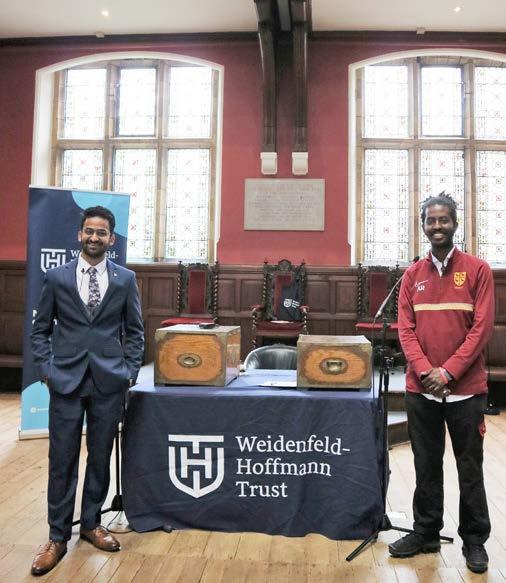
Scholar Karan Gupta with The Oxford Union President, Adam Roble
for scholars about their professional and academic work, Melissa Penagos and Darin Hussein created opportunities for scholars to meet outdoors throughout the lockdown period.
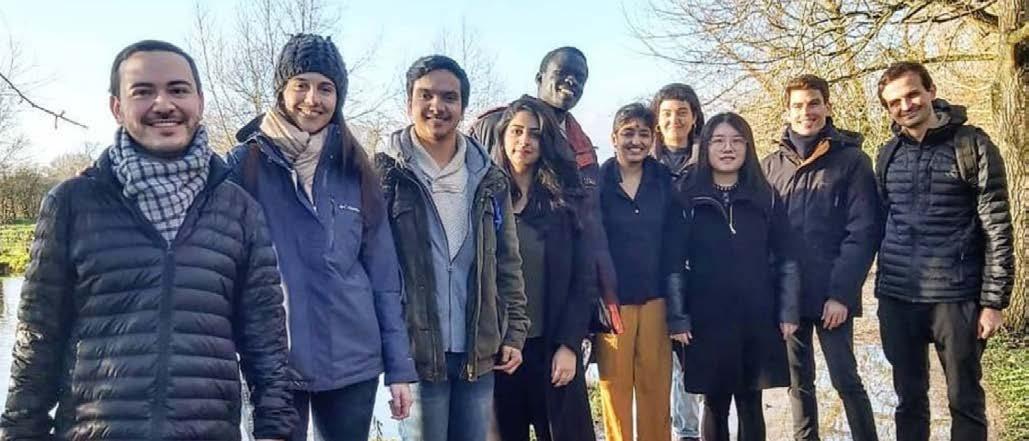
DEBATING CELEBRATES HUMANITY
Manuel Francisco Azuero
Colombia, Master of Public Policy Oxford-Weidenfeld and Hoffmann-Abraham/Rausing, Trinity College
There are many reasons to celebrate debating. But among them, there are three that really make me passionate. Let me elaborate further.
THE CONVENING POWER OF DEBATES
A debate is of course, at the very least, a meeting of two. In a world profoundly fragmented, often affected by prejudices that fuel segregation and hate amongst communities (very frequently amongst people that don’t even know each other), the ability to bring people together is very powerful and much needed. It reveals a fundamental fact that is frequently ignored: we all have something in common, and when “in common” I don’t mean something that we agree on. No. I am referring to something that we inherently share, a concern, a question, a collective element – whatever form it takes – that reflects a piece of our common humanity.
Hence, even when the apparent goal of debating is to confront opposing claims, a genuine debate humanizes the confrontation. And in that sense, I believe that a debate works as a source of empathy and as an antidote against violence. An extraordinary human invention to experience in peace the forest of our differences and thrive. In fact, the other remarkable capability of debating is precisely congregating people that hold different views. That takes us to the next factor.
ACKNOWLEDGING, ACCEPTING, AND ENGAGING WITH DIVERSITY
Our thoughts, our feelings, our beliefs, our values, our arguments, are diverse. We debate because we recognize that we are not a monolith. An authentic debate is based on the premise that, within human communities, different views, positions, opinions should be admitted and acknowledged. Through history debating has been frequently used as an exclusionary mechanism, a conversation between rather similar people that has marginalized and oppressed others. A debate can only be true to itself if it is open to human diversity. This is not to say that debating is simply an exhibition of diversity. It goes beyond mere appreciation. It is a dialectic and active confrontation of differences. Not for domination nor for subjugation, but for collective reflection.
DEBATES FOSTER REFLECTION AMONG THE DEBATERS AND THE AUDIENCE
Regardless of the distinct strength of the arguments of one side or the other and despite the stated objective to “win” the argument, the idea of debating is built upon the recognition of our intrinsic fallibility. Debating is a critical inquiry of humans’ viewpoints and a powerful rejection of perfection. It allows us to address the fallibility of the ‘opposing’ views but also, if the spirit of the exercise is fully embraced, the fallibility of our own, because we are forced to reflect on the consistency and coherence of our positions. As Timothy Garton Ash wrote in the Free Speech Debate project of St Antony’s College, “we cannot get at the truth unless we are exposed to the relevant facts, opinion and arguments. Even false ones may contain a silver of truth or provoke us to clarify our own as we respond to them”.
THREE NUGGETS OF LEADERSHIP
Mirza Beg
India, Master of Public Policy Oxford-Hoffmann, Kofi Annan Scholarship, Mansfield College
After coping with uncertainty this entire year, the Leadership forum gave us a few days to undertake new challenges and reflect. This year has shown us how difficult situations call for effective leadership – leadership that can instil hope and forge new possibilities. This requires a very specific kind of mindset and that is exactly what the Leadership Forum has given each participant. I’d like to share some of the non-academic, interpersonal skills I learned from my fellow participants.
LISTENING WITH INTENTION AND EMPATHY
As we get older, we tend to lose childlike curiosity. It becomes clear that it is inappropriate to ask all the questions that come to mind, and we become guarded. Consequently, we engage in surface-level conversations, rarely digging more in-depth. During the leadership program we learnt how it is essential to listen with care and engage yourself actively with empathy. In one session, we were split into pairs, and we expressed moments from our lives that brought us most happiness. We then proceeded to share this experience with another person. In doing so, we were trained to actively listen, without any judgment, and be expansively mindful.
HOLDING CRITICAL CONVERSATIONS
As an evolutionary defence mechanise, our mind is hard-wired to consider the nearest outcomes of a given situation, and more importantly, to seek shortcuts to arriving at the outcome with minimal risk. Giving in to this approach makes one comfortable and growth takes longer within these comfort zones. We stick to our biases because we do not take the risk of uncomfortable situations. The leadership training at WHT’s Leadership forum provided us with a framework to mitigate our confirmation biases and dive deep into the evaluation of a situation. We were shown how to ask questions that are succinct, clear and, most importantly, how to move away from scripted/formulaic questions and rather ask questions in the moment.
GIVING AND RECEIVING FEEDBACK
Constructive criticism can boost learning, and bad criticism can be detrimental. It is important to build trust so that the feedback is not taken as an attack on someone’s ability. During one simulation session, we were divided into groups, asked to elect a leader, and follow their strategy to complete a certain task. When the groups were done, we were asked to provide feedback to our leader and share our experience with the group. What I observed here was that success lies in being specific with clear, actionable points. Our group leader was able to create a clear plan, through consensus, and execute it by distributing the labour efficiently.
Receiving feedback is not easy and it is not sufficient to package it like a ‘compliment sandwich’ with the feedback stuffed in between. One must endeavour to check their motives before giving feedback and ensure that you suggest concrete step for improvement. This helps the group build on its successes, develop trust and comfort while the sandwiches can be left for lunch.
As an environmental engineer I decided long ago that I wanted to dedicate my life to protecting the water resources of the planet. This is why I want to thank the Weidenfeld-Hoffmann Trust and the Louis Dreyfus “
Foundation for supporting me in this path and for giving me the extraordinary opportunity to study at the
University of Oxford.”
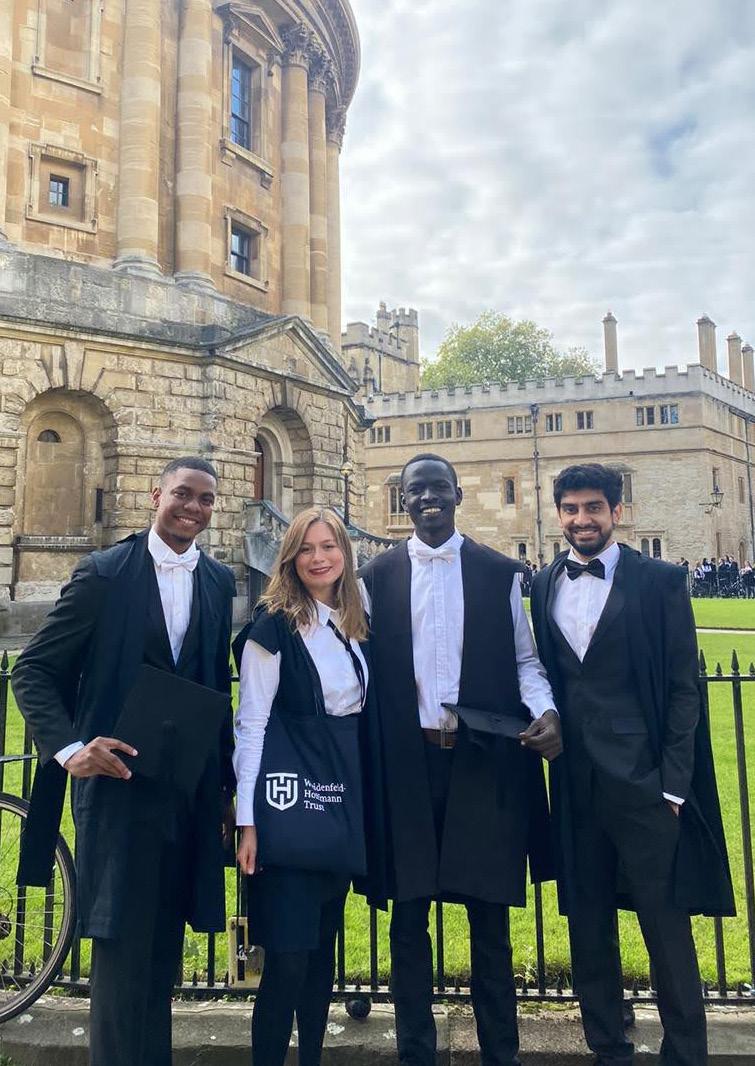
Maria Mercedes Kuri
Argentina MSc Water Science, Policy and Management Louis Dreyfus-Weidenfeld and Hoffmann Worcester College
ALUMNI GROWING IMPACT
LIVING THE LEADERSHIP PROGRAMME VALUES – MAKING A VISIBLE DIFFERENCE
312 alums from 79 countries have benefited from the Leadership Programme to tackle major problems in their countries and regions of origin or from within multilateral organisations. Many of them have shared their experiences with us in the WHT Alumni Webinar Series, from establishing a small coffee business in Vietnam to evaluating investments for multilateral development banks in Saudi Arabia, from mitigating human-nature conflicts in Namibia to resolving human conflicts in Ethiopia and Afghanistan, from developing water and sanitation services to prevent cholera outbreaks in Zimbabwe, to fighting a full-blown COVID pandemic in South Africa.
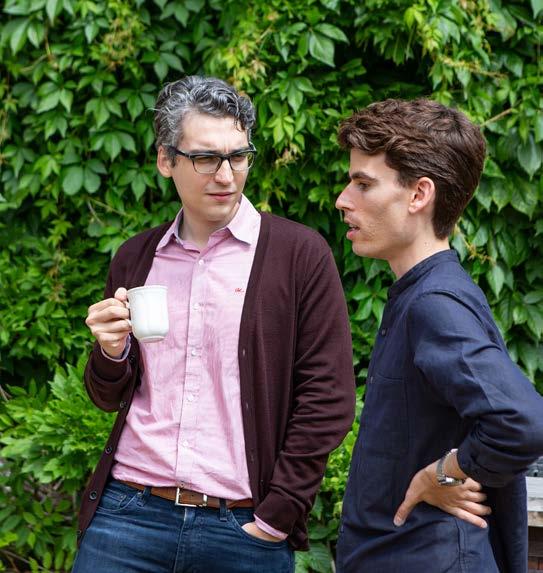
WHERE DO OUR ALUMS COME FROM?
8%
8% 17%
17%
14%
14% 19%
19%
25%
25% Pablo (left), 2020 scholar from Argentina, meets Alejandro (right), 2021 scholar from Argentina, at the Leadership Forum.
The biggest tragedy for a nation is when there is an abundance of brilliant minds but limited opportunities. This is the truth for many developing nations. It gives me such happiness “ Africa to be a part of a Trust that is fiercely dedicated to bridging that gap and training leaders! WHT did Eastern Asia not just give us the means to gain an education at Oxford but it provided us with a community Eastern Europe of young like minded leaders across the world who we now call family, and guidance from the wonder team and board that leads the Trust!”Latin America
17%
17%
Africa Eastern Asia Eastern Europe Latin America North America Western Asia
North America
Western Asia
Gurmehar Kaur
India, 2020 OxfordWeidenfeld and Hoffmann-Rosner Global ambassador for Digital Peace Now










